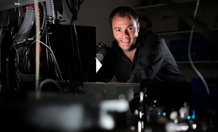
Dr Julian Moger of the School of Engineering, Mathematics and Physical Sciences in the lab. Photo by Tim Pestridge.
30 new scientists boost Exeter research
30 new scientists, six of them professors, are being appointed to new academic posts at the University of Exeter.
The positions are funded through the University’s £80 million investment in science, and will help to cement Exeter’s position as one of the top ten universities in the UK.
23 of the scientists have now been appointed and the University aims to recruit all 30 scientists over this academic year. This is the first phase of recruitment and the University is aiming to increase the number of University of Exeter academics from 650 to approaching 1,000 by 2015.
In April 2008 the University of Exeter announced plans to invest £80 million in science, medicine and engineering in five themes, building on existing areas of excellence. The University is now spending £30 million on new appointments and infrastructure to boost research and anticipates attracting up to £50 million from external sources.
The initial posts all support the University’s research in five areas: ‘Climate change and sustainable futures’, ‘Extrasolar Planets’, ‘Functional materials’, ‘Systems biology’ and ‘Translational medicine, personalised healthcare and public health’.
The new posts range from lecturer positions to professorships, all involving both research and teaching. The University will encourage academics from different disciplines to work together on joint research projects. For example, physical scientists will be working with social scientists to come up with practical solutions to the problems resulting from climate change.
Professor Janice Kay, Senior Deputy Vice-Chancellor of the University of Exeter, said: “We welcome these 23 new scientists to Exeter. These excellent appointments will provide a real boost to our research into science, engineering and medicine, helping us compete with the best universities in the UK. Building on our existing expertise in these areas, this investment will enable us to make a real difference by tackling some of the biggest issues of the 21st century.”
The five research themes being supported by the £80 million investment in science are:
- Climate change and sustainable futures: The University is significantly enhancing its strengths in understanding climate change impacts and developing sustainable solutions. This builds on its world-leading research in climate prediction, adaptation and mitigation, and close liaison with the Met Office Hadley Centre.
- Systems biology: Already developing a world-class reputation in biosciences, the University is investing provide state-of-the-art facilities and new appointments to develop models of key biological systems.
- Extrasolar planets: The University is establishing a centre for cross-disciplinary research into the physics of extrasolar planets - planets outside our solar system – which will be unique in the UK. Bringing together mathematicians and theoretical astrophysicists with observational astrophysicists, researchers will directly test their predictions using state-of-the-art equipment.
- Functional materials: The University will bring together its world-leading expertise in engineering ‘smart’ materials and fundamental physics research in photonics and nanomaterials to create innovative new materials. Exeter’s £120 million science park will capitalise on the near-term high-tech industrial applications of this work
- Translational medicine, personalised healthcare and public health: Exeter is internationally recognised for clinical and translational research in diabetes, mood disorders and interventions to achieve behavioural change for health. The University will invest significantly to enhance novel research opportunities to accelerate the translation of clinical research to health gain.
Date: 20 October 2009
